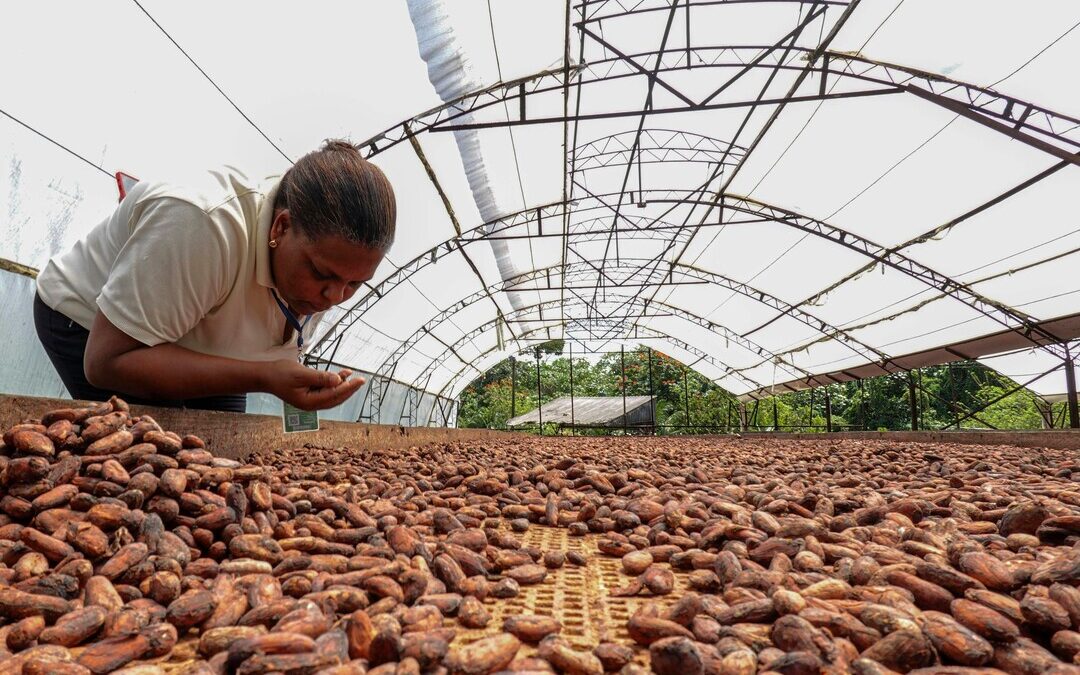EU’s Chocolate Industry Faces $56B Threat from Climate and Biodiversity Risks
EU food imports face major threats as climate change and biodiversity loss hit cocoa, rice, maize and wheat.
Nearly half of the European Union’s food imports – including critical staples like maize, wheat and rice, as well as coffee, soy and cocoa – are under threat due to escalating climate change and biodiversity loss in supplier countries, a new report warns, putting up to $50 billion in European chocolate production at risk.
The report, Climate and Biodiversity Risks to EU Food Imports, reveals that more than 50 percent of EU imports for six major agri-food commodities come from countries with low to low-medium climate readiness, meaning they are both vulnerable to climate shocks and lack the capacity to adapt.
Among these, cocoa – the key ingredient in chocolate – faces the most acute combined climate and biodiversity risks, prompting industry fears of an ongoing “chocolate crisis.”
Cocoa Crisis: Sweet Treat in Bitter Trouble
The EU is the world’s largest consumer, producer and exporter of chocolate, with a market valued at $50 billion. Yet its chocolate supply is entirely reliant on imported cocoa, primarily from West African nations such as Côte d’Ivoire and Ghana – countries facing intensifying climate risks, reduced biodiversity, and falling yields.
According to the report, 96.5 percent of EU cocoa imports originate from nations with low or low-medium climate readiness. In comparison, 77 percent come from areas with medium or lower biodiversity intactness, far below the 90 percent “safe threshold.”
These pressures have already contributed to harvest cuts of nearly 50 percent in Ghana and price spikes that saw cocoa import values rise 41 percent between 2023 and 2024.
“Chocolate makers are being squeezed,” the report states, citing layoffs by Barry Callebaut, the world’s largest chocolate producer, and the closure of at least a dozen small European chocolatiers in the past year.
Staples at Stake
Beyond cocoa, staple food imports are under similar threat. The EU relies on imports for over a third of its rice and 20 percent of its maize.
Alarmingly, 90.4 percent of rice imports in 2023 came from countries with low to low-medium climate readiness, including Pakistan, which lost 80 percent of its rice crop in 2022 due to monsoon-linked flooding.
Biodiversity loss compounds these risks. The report finds that a majority of maize and wheat imports come from countries with medium or lower biodiversity levels, which reduces ecosystem resilience and amplifies the impact of climate shocks.
“The risks are not theoretical,” the authors warn. “They are already impacting prices, yields, and livelihoods – both in the EU and in producing countries.”
Smallholder Farmers, Big Impact
The report highlights the vulnerability of small-scale producers, who are the backbone of these supply chains. About 90 percent of global cocoa and 73 percent of coffee is grown on farms smaller than five hectares. Yet in 2021, only 0.3 percent of international climate finance reached these producers.
Without targeted support, the authors argue, the EU’s food security – and the stability of its €158.6 billion agri-food import market – hangs in the balance.
Policy Recommendations: Finance and Fairness
To address the crisis, the report urges the EU to prioritize climate adaptation and biodiversity finance to key exporting nations.
It calls for the European Commission’s directorates to coordinate funding for climate-smart, biodiversity-enhancing practices such as agroecology and to ensure that climate finance is accessible to grassroots farmer organizations.
The report warns that reshoring food production or simply diversifying suppliers is not enough. Climate change and biodiversity loss are systemic and global, and Europe’s food system cannot isolate itself.
“Cutting climate and development budgets to boost defense is a false economy,” the report concludes. “Investment in climate and biodiversity resilience abroad is an investment in food security at home.”
Also Read:
Nestlé, ofi Launch Global Cocoa Agroforestry Project to Cut CO2 Emissions
Nirmal Menon
Related posts
Subscribe
Error: Contact form not found.


